- Home
- William Gibson
The Difference Engine Page 2
The Difference Engine Read online
Page 2
But couldn't you just do anything with money in England, if you were clever? Someday Mr. Aaron, a whiskery old merchant Jew from Whitechapel, would have a lordship, with a steam-gurney waiting at the curb and his own coat of arms on the coachwork. The Rad Parliament wouldn't care that Mr. Aaron was no Christian. They'd given Charles Darwin a lordship, and he said that Adam and Eve were monkeys.
The liftman, gotten up in a Frenchified livery, drew the rattling brass gate aside for her. Mick followed her in, his parcel tucked under his arm, and then they were descending.
They emerged from Aaron's into Whitechapel jostle. While Mick checked a street-map he took from his coat, she gazed up at the shifting letters that ran the length of Aaron's frontage. A mechanical frieze, a slow sort of kinotrope for Aaron's adverts, made all of little bits of painted wood, clicking about each in turn, behind leaded sheets of bevel-glass. CONVERT YOUR MANUAL PIANO, the jostling letters suggested, INTO A KASTNER'S PIANOLA.
The skyline west of Whitechapel was spikey with construction cranes, stark steel skeletons painted with red lead against the damp. Older buildings were furred with scaffolding; what wasn't being torn down, it seemed, to make way for the new, was being rebuilt in its image. There was a distant huffing of excavation, and a tremulous feeling below the pavement, of vast machines cutting some new underground line.
But now Mick turned left, without a word, and walked away, his hat cocked to one side, his checkered trouser-legs flashing under the long hem of his greatcoat. She had to hurry to match his step. A ragged boy with a numbered tin badge was sweeping mucky snow from the crossing; Mick tossed him a penny without breaking stride and headed down the lane called Butcher Row.
She caught up and took his arm, past red and white carcasses dangling from their black iron hooks, beef and mutton and veal, and thick men in their stained aprons crying their goods. London women crowded there in scores, wicker baskets on their arms. Servants, cooks, respectable wives with men at home. A red-faced squinting butcher lurched in front of Sybil with a double handful of blue meat. "Hallo, pretty missus. Buy your gentleman my nice kidneys for pie!" Sybil ducked her head and walked around him.
Parked barrows crowded the curb, where costers stood bellowing, their velveteen coats set off with buttons of brass or pearl. Each had his numbered badge, though fully half the numbers were slang, Mick claimed, as slang as the costers' weights and measures. There were blankets and baskets spread on neatly chalked squares on the paving, and Mick was telling her of ways the costers had to plump out shrunken fruit, and weave dead eels in with live. She smiled at the pleasure he seemed to take in knowing such things, while hawkers yelped about their brooms and soap and candles, and a scowling organ-grinder cranked, two-handed, at his symphony machine, filling the street with a fast springy racket of bells, piano-wire, and steel.
Mick stopped beside a wooden trestle-table, kept by a squint-eyed widow in bombazine, the stump of a clay pipe protruding from her thin lips. Arrayed before her were numerous vials of some viscous-looking substance Sybil took to be a patent medicine, for each was pasted with a blue slip of paper bearing the blurred image of a savage red Indian. "And what would this be, mother?" Mick inquired, tapping one red-waxed cork with a gloved finger.
"Rock-oil, mister," she said, relinquishing the stem of her pipe, "much as they call Barbados tar." Her drawling accent grated on the ear, but Sybil felt a pang of pity. How far the woman was from whatever outlandish place she'd once called home.
"Really," Mick asked, "it wouldn't be Texian?"
" 'Healthful balm,' " the widow said, " 'from Nature's secret spring, the bloom of health and life to man will bring.' Skimmed by the savage Seneca from the waters of Pennsylvania's great Oil Creek, mister. Three pennies the vial and a guaranteed cure-all." The woman was peering up at Mick now with a queer expression, her pale eyes screwed tight in nests of wrinkles, as though she might recall his face. Sybil shivered.
"Good day to you, then, mother," Mick said, with a smile that somehow reminded Sybil of a vice detective she'd known, a sandy little man who worked Leicester Square and Soho; the Badger, the girls had called him.
"What is it?" she asked, taking Mick's arm as he turned to go. "What is it she's selling?"
"Rock-oil," Mick said, and she caught his sharp glance back at the hunched black figure. "The General tells me it bubbles from the ground, in Texas… "
Sybil was curious. "Is it a proper cure-all, then?"
"Never mind," he said, "and here's an end to chat." He was glancing bright-eyed down the lane. "I see one, and you know what to do."
Sybil nodded, and began to pick her way through the market-crowd toward the man Mick had seen. He was a ballad-seller, lean and hollow-cheeked, his hair long and greasy under a tall hat wrapped in bright polka-dot fabric. He held both his arms bent, hands knotted as if in prayer, the sleeves of his rumpled jacket heavy with long rustling quires of sheet-music.
" 'Railway to Heaven,' ladies and gents," the ballad-seller chanted, a veteran patterer. " 'Of truth divine the rails are made, and on the Rock of Ages laid; the rails are fixed in chains of love, firm as the throne of God above.' Lovely tune and only tuppence, miss."
"Do you have "The Raven of San Jacinto'?" Sybil asked.
"I can get that, I can get it," the seller said. "And what's that then?"
"About the great battle in Texas, the great General?"
The ballad-seller arched his brows. His eyes were blue and crazily bright, with hunger, perhaps, or religion, or gin. "One of your Crimea generals then, a Frenchy, this Mr. Jacinto?"
"No, no," Sybil said, and gave him a pitying smile, "General Houston, Sam Houston of Texas. I do want that song, most particular."
"I buy my publications fresh this afternoon, and I'll look for your song for you sure, miss."
"I shall want at least five copies for my friends," Sybil said.
"Ten pence will get you six."
"Six, then, and this afternoon, at this very spot."
"Just as you say, miss." "The seller touched the brim of his hat.
Sybil walked away, into the crowd. She had done it. It was not so bad. She felt she could get used to it. Perhaps it was a good tune, too, one that people would enjoy when the balladman was forced to sell the copies.
Mick sidled up suddenly, at her elbow.
"Not bad," Mick allowed, reaching into the pocket of his greatcoat, like magic, to produce an apple turnover, still hot, flaking sugar and wrapped in greasy paper.
"Thank you," she said, startled but glad, for she'd been thinking of stopping, hiding, fetching out the stolen shawl, but Mick's eyes had been on her every moment. She hadn't seen him, but he'd been watching; that was the way he was. She wouldn't forget again.
They walked, together and apart, all down Somerset, and then through the vast market of Petticoat Lane, lit as evening drew on with a host of lights, a glow of gas-mantles, the white glare of carbide, filthy grease-lamps, tallow dips twinkling among the foodstuffs proffered from the stalls. The hubbub was deafening here, but she delighted Mick by gulling three more ballad-sellers.
In a great bright Whitechapel gin-palace, with glittering gold-papered walls flaring with fishtail gas-jets, Sybil excused herself and found a ladies' convenience. There, safe within a reeking stall, she fetched the shawl out. So soft it was, and such a lovely violet color too, one of the strange new dyes clever people made from coal. She folded the shawl neatly, and stuffed it through the top of her corset, so it rested safe. Then out to join her keeper again, finding him seated at a table. He'd bought her a noggin of honey gin. She sat beside him.
"You did well, girl," he said, and slid the little glass toward her. The place was full of Crimean soldiers on furlough, Irishmen, with street-drabs hanging on them, growing red-nosed and screechy on gin. No barmaids here, but big bruiser bully-rock bartenders, in white aprons, with mill-knocker clubs behind the bar.
"Gin's a whore's drink, Mick."
"Everybody likes gin," he said. "And you
're no whore, Sybil."
"Dollymop, bobtail." She looked at him sharply. "What else d'ye call me, then?"
"You're with Dandy Mick now," he said. He leaned his chair back, jabbing his gloved thumbs through the arm-holes of his waistcoat. "You're an adventuress."
"Adventuress?"
"Bloody right." He straightened. "And here's to you." He sipped his gin-twist, rolled it over his tongue with an unhappy look, and swallowed. "Never mind, dear—they've cut this with turpentine or I'm a Jew." He stood up.
They left. She hung on his arm, trying to slow his pace. " 'Adventurer,' that's what you are, then, eh, Mr. Mick Radley?"
"So I am, Sybil," he said softly, "and you're to be my 'prentice. So you do as you're told in the proper humble spirit. Learn the tricks of craft. And someday you join the union, eh? The guild."
"Like my father, eh? You want to make a play of that, Mick? Who he was, who I am?"
"No," Mick said flatly. "He was old-fashioned, he's nobody now."
Sybil smirked. "They let us wicked girls into this fancy guild of yours, do they, Mick?"
"It's a knowledge guild," he said soberly. "The bosses, the big'uns, they can take all manner of things away from us. With their bloody laws and factories and courts and banks… They can make the world to their pleasure, they can take away your home and kin and even the work you do… " Mick shrugged angrily, his lean shoulders denting the heavy fabric of the greatcoat. "And even rob a hero's daughter of her virtue, if I'm not too bold in speaking of it." He pressed her hand against his sleeve, a hard, trapping grip. "But they can't ever take what you know, now can they, Sybil? They can't ever take that."
Sybil heard Hetty's footsteps in the hall outside her room, and the rattle of Hetty's key at the door. She let the serinette die down, with a high-pitched drone.
Hetty tugged the snow-flaked woollen bonnet from her head, shrugging free from her Navy cloak. She was another of Mrs. Winterhalter's girls, a big-boned, raucous brunette from Devon, who drank too much, but was sweet in her way, and always kind to Toby.
Sybil folded away the china-handled crank and lowered the cheap instrument's scratched lid. "I was practicing. Mrs. Winterhalter wants me to sing next Thursday."
"Bother the old drab," Hetty said. "Thought this was your night out with Mr. C. Or is it Mr. K.?" Hetty stamped warmth into her feet before the narrow little hearth, then noticed, in the lamplight, the scattering of shoes and hat-boxes from Aaron & Son. "My word," she said, and smiled, her broad mouth pinched a bit with envy. "New beau, is it? You're so lucky, Sybil Jones!"
"Perhaps." Sybil sipped hot lemon-cordial, tilling her head back to relax her throat.
Hetty winked. "Winterhalter doesn't know about this one, eh?"
Sybil shook her head and smiled. Hetty would not tell. "D'ye know anything about Texas, Hetty?"
"A country in America," Hetty said readily. "French own it, don't they?"
"That's Mexico. Would you like to go to a kinotrope show, Hetty? The former President of Texas is lecturing. I've tickets, free for the taking."
"When?"
"Saturday."
"I'm dancing then," Hetty said. "Perhaps Mandy would go." She blew warmth into her fingers. "Friend of mine comes by late tonight, wouldn't trouble you, would it?"
"No," Sybil said. Mrs. Winterhalter had a strict rule against any girl keeping company with men in her room. It was a rule Hetty often ignored, as if daring the landlord to peach on her. Since Mrs. Winterhalter chose to pay the rent directly to the landlord, Mr. Cairns, Sybil seldom had call to speak to him, and less with his sullen wife, a thick-ankled woman with a taste for dreadful hats. Cairns and his wife had never informed against Hetty, though Sybil was not sure why, for Hetty's room was next to theirs, and Hetty made a shameless racket when she brought men home—foreign diplomats, mostly, men with odd accents and, to judge by the noise, beastly habits.
"You can carry on singing if you like," Hetty said, and knelt before the ash-covered fire. "You've a fine voice. Mustn't let your gifts go to waste." She began to feed individual coals to the hearth, shivering. A dire chill seemed to enter the room then, through the cracked casement of one of the nailed-up windows, and for a strange passing moment Sybil felt a distinct presence in the air. A definite sense of observation, of eyes fixed upon her from another realm. She thought of her dead father. Learn the voice, Sybil. Learn to speak. It's all we have that can fight them, he had told her. This in the last few days before his arrest, when it was clear that the Rads had won again—clear to everyone, perhaps, save Walter Gerard. She had seen then, with heart-crushing clarity, the utter magnitude of her father's defeat. His ideals would be lost—not just misplaced but utterly expunged from history, to be crushed again and again and again, like the carcass of a mongrel dog under the racketing wheels of an express train. Learn to speak, Sybil. It's all we have…
"Read to me?" Hetty asked. "I'll make tea."
"Very well." In her spotty, scattered life with Hetty, reading aloud was one of the little rituals they had that passed for domesticity. Sybil took up the day's Illustrated London News from the deal table, settled her crinoline about her in the creaking, damp-smelling armchair, and squinted at a front-page article. It concerned itself with dinosaurs.
The Rads were mad for these dinosaurs, it seemed. Here was an engraving of a party of seven, led by Lord Darwin, all peering intently at some indeterminate object embedded in a coal-face in Thuringia. Sybil read the caption aloud, showed the picture to Hetty. A bone. The thing in the coal was a monstrous bone, as long as a man was tall. She shuddered. Turning the page, she encountered an artist's view of the creature as it might have looked in life, a monstrosity with twin rows of angry triangular saw-teeth along its humped spine. It seemed the size of an elephant at least, though its evil little head was scarcely larger than a hound's.
Hetty poured the tea. " 'Reptiles held sway across the whole of the earth,' eh?" she quoted, and threaded her needle. "I don't believe a bloody word of it."
"Why not?"
"They're the bones of bloody giants, out of Genesis. That's what the clergy say, ain't it?"
Sybil said nothing. Neither supposition struck her as the more fantastic. She turned to a second article, this one in praise of Her Majesty's Artillery in the Crimea. She found an engraving of two handsome subalterns admiring the operation of a long-range gun. The gun itself, its barrel stout as a foundry stack, looked fit to make short work of all Lord Darwin's dinosaurs. Sybil's attention, however, was held by an inset view of the gunnery Engine. The intricate nest of interlocking gearwork possessed a queer beauty, like some kind of baroquely fabulous wallpaper.
"Have you anything that needs darning?" Hetty asked.
"No, thank you."
"Read some adverts, then," Hetty advised. "I do hate that war humbug."
There was HAVILAND CHINA, from Limoges, France; VIN MARIANI, the French tonic, with a testimonial from Alexandre Dumas and Descriptive Book, Portraits, and Autographs of Celebrities, upon application to the premises in Oxford Street; SILVER ELECTRO SILICON POLISH, it never scratches, never wears, it is unlike others; the "NEW DEPARTURE" BICYCLE BELL, it has a tone all its own; DR. BAYLEY'S LITHIA WATER, cures Bright's disease and the gouty diathesis; GURNEY'S "REGENT" POCKET STEAM-ENGINE, intended for use with domestic sewing machines. This last held Sybil's attention, but not through its promise to operate a machine at double the old speed at a cost of one halfpenny per hour.
Here was an engraving of the tastefully ornamented little boiler, to be heated by gas or paraffin. Charles Egremont had purchased one of these for his wife. It came equipped with a rubber tube intended to vent the waste steam when jammed under a convenient sash-window, but Sybil had been delighted to hear that it had turned Madame's drawing-room into a Turkish bath.
When the paper was finished, Sybil went to bed. She was woken around midnight by the savage rhythmic crouching of Hetty's bed-springs.
It was dim in the Garrick Theatre, dusty and cold, with the pit
and the balcony and the racks of shabby seats; but it was pitch-dark below the stage, where Mick Radley was, and it smelled of damp and lime.
Mick's voice echoed up from under her feet. "Ever seen the innards of a kinotrope, Sybil?"
"I saw one once, backstage," she said. "At a music-hall, in Bethnal Green. I knew the fellow what worked it, a clacker cove."
"A sweetheart?" Mick asked. His echoing voice was sharp.
"No," Sybil told him quickly, "I was singing a bit… But it scarcely paid."
She heard the sharp click of his repeating match. It caught on the third attempt and he lit a stub of candle. "Come down," he commanded. "Don't stand there like a goose, showing off your ankles." Sybil lifted her crinoline with both hands and picked her way uneasily down the steep damp stairs.
Mick reached up to grope behind a tall stage-mirror, a great gleaming sheet of silvered glass, with a wheeled pedestal and oily gears and worn wooden cranks. He retrieved a cheap black portmanteau of proofed canvas, placed it carefully on the floor before him, and squatted to undo the flimsy tin clasps. He removed a stack of perforated cards bound with a ribbon of red paper. There were other bundles in the bag as well, Sybil saw, and something else, a gleam of polished wood.
He handled the cards gently, like a Bible.
"Safe as houses," he said. "You just disguise 'em, you see—write something stupid on the wrapper, like 'Temperance Lecture—Parts One Two Three.' Then coves never think to steal 'em, or even load them up and look." Hefting the thick block, he riffled its edge with his thumb, so that it made a sharp crisp sound, like a gambler's new deck. "I put a deal of capital in these," he said. "Weeks of work from the best kino hands in Manchester. Exclusively to my design, I might point out. 'Tis a lovely thing, girl. Quite artistic, in its way. You'll soon see."

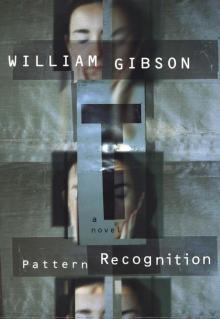 Pattern Recognition
Pattern Recognition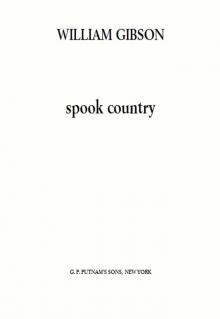 Spook Country
Spook Country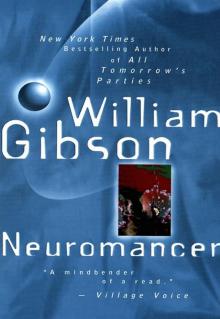 Neuromancer
Neuromancer Skinner's Room
Skinner's Room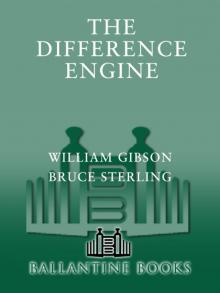 The Difference Engine
The Difference Engine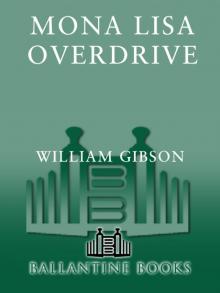 Mona Lisa Overdrive
Mona Lisa Overdrive Zero History
Zero History The Peripheral
The Peripheral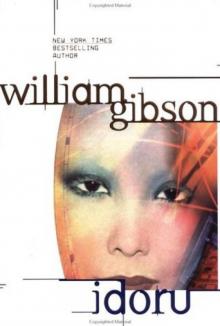 Idoru
Idoru Johnny Mnemonic
Johnny Mnemonic Count Zero
Count Zero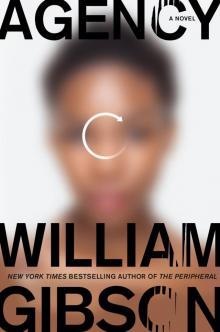 Agency
Agency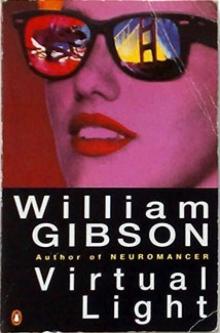 Virtual Light
Virtual Light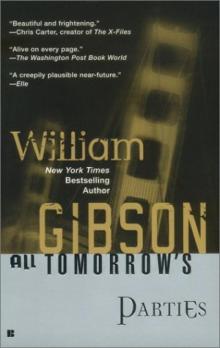 All Tomorrow's Parties
All Tomorrow's Parties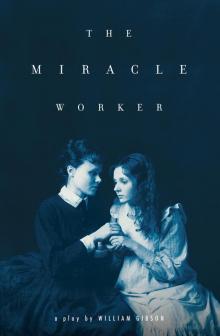 The Miracle Worker
The Miracle Worker Disneyland with the Death Penalty
Disneyland with the Death Penalty Idoru tb-2
Idoru tb-2 Count Zero s-2
Count Zero s-2 The Gernsback Continuum
The Gernsback Continuum New Rose hotel (tales)
New Rose hotel (tales)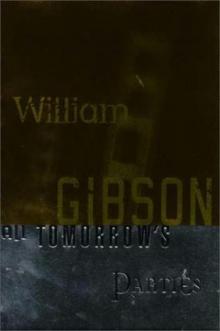 All Tomorrow's Parties bt-3
All Tomorrow's Parties bt-3 Hinterlands
Hinterlands Thirteen Views Of A Cardboard City
Thirteen Views Of A Cardboard City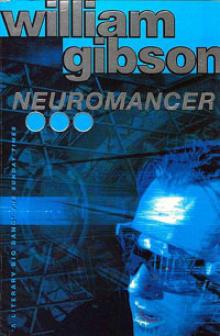 Neuromancer ts-1
Neuromancer ts-1 Virtual light b-1
Virtual light b-1